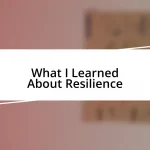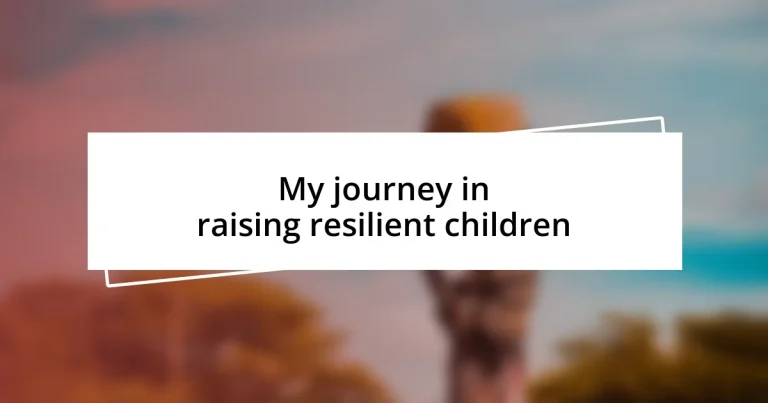Key takeaways:
- Resilience in children involves equipping them with emotional tools to cope with challenges and learn from failures.
- Fostering resilience requires intentional strategies such as promoting a growth mindset, teaching self-advocacy, and establishing routines.
- Building a support network of caring adults and mentors helps children develop resilience and confidence.
- Celebrating progress and achievements, no matter how small, boosts children’s self-esteem and reinforces their ability to tackle larger challenges.
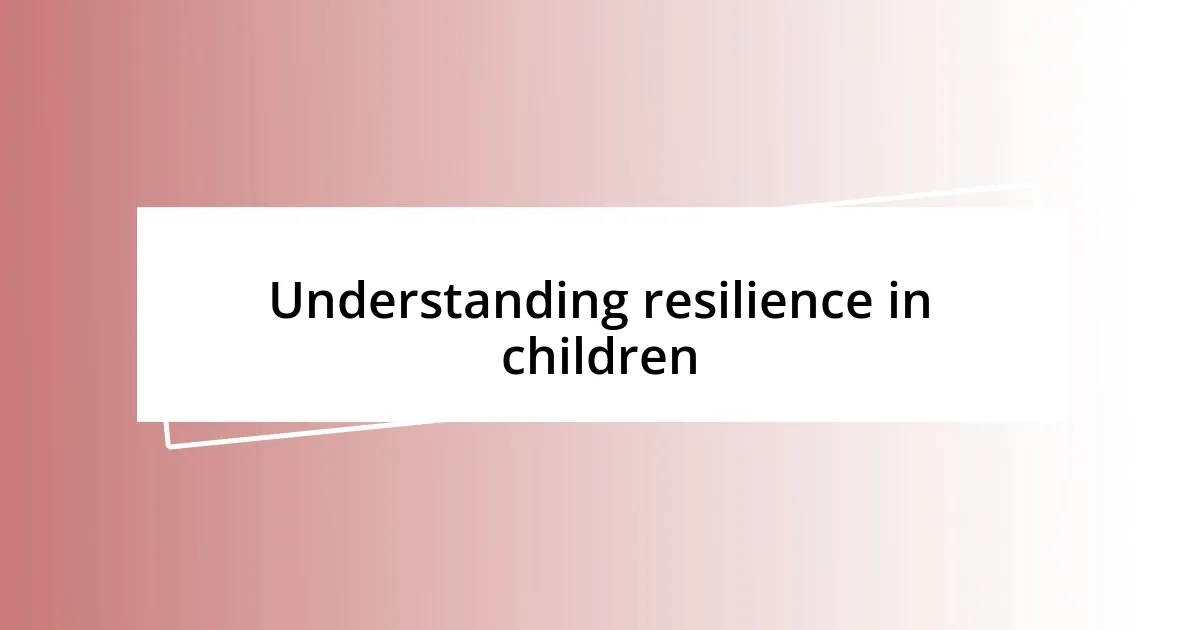
Understanding resilience in children
Resilience in children is not just about bouncing back from setbacks; it’s about equipping them with the emotional tools to navigate life’s challenges. I remember a day when my daughter faced a big disappointment at school; she failed a test she’d studied hard for. I could see her tears, and instead of rushing to console her, I asked, “What did you learn from this experience?” It was a turning point that emphasized that failure can be a stepping stone to growth.
Children often encounter various stressors, and their ability to cope can vary significantly. I’ve found that encouraging open conversations about emotions can lay a strong foundation for resilience. For instance, one evening during our family dinner, I shared a story about my own failure and how it shaped my journey. This prompted my son to open up about a challenging moment he was facing, reminding me how powerful empathy can be in helping children build their resilience.
From my experience, resilient children learn to adjust to challenges through positive relationships, self-regulation, and a sense of purpose. When my son faced bullying, we used it as a teaching moment, focusing on how he could assert himself while also finding support in friends. It led me to realize that resilience isn’t just inherent; it’s nurtured through our everyday interactions and challenges. How do you see resilience shaping your child’s perspective on obstacles?
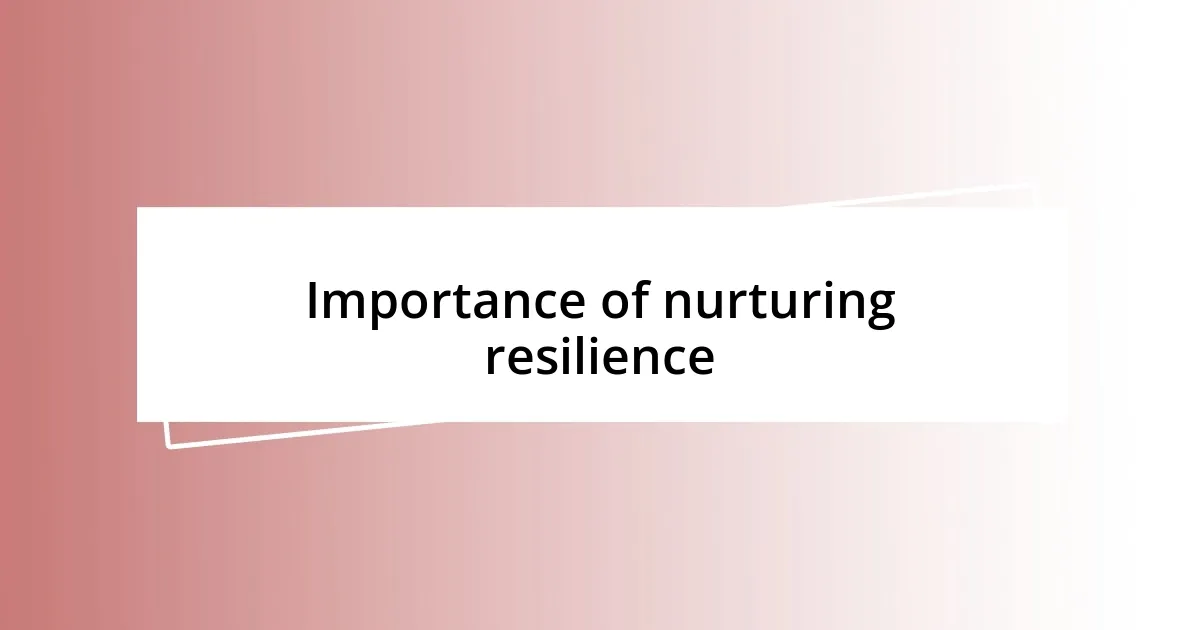
Importance of nurturing resilience
Nurturing resilience in children is crucial in today’s fast-paced world. I’ve seen firsthand that when children develop resilient traits, they become more equipped to tackle adversity. For example, after my son faced challenges in sports, I encouraged him to focus not just on winning but on the effort he put in. This shift in perspective not only built his confidence but also helped him appreciate the journey rather than just the outcome. It was a powerful moment that highlighted how resilience can reshape their approach to life.
Here are some key reasons why nurturing resilience is essential:
- Encourages Problem-Solving: Resilient children learn to break down challenges and find solutions, which fosters independence.
- Builds Emotional Awareness: They develop a greater understanding of their emotions and how to manage them, making it easier to navigate complex social situations.
- Strengthens Relationships: Resilience often leads to healthier relationships, as children become more empathetic and better communicators.
- Enhances Academic Performance: Engaged in their learning processes, resilient children are more likely to persist through difficulties in school.
- Promotes a Growth Mindset: They learn that failures are opportunities for growth, which instills a lifelong love for learning.
As I reflect on my experiences, I realize that fostering resilience isn’t just a task; it’s an ongoing journey that empowers children to embrace life’s ups and downs with confidence.
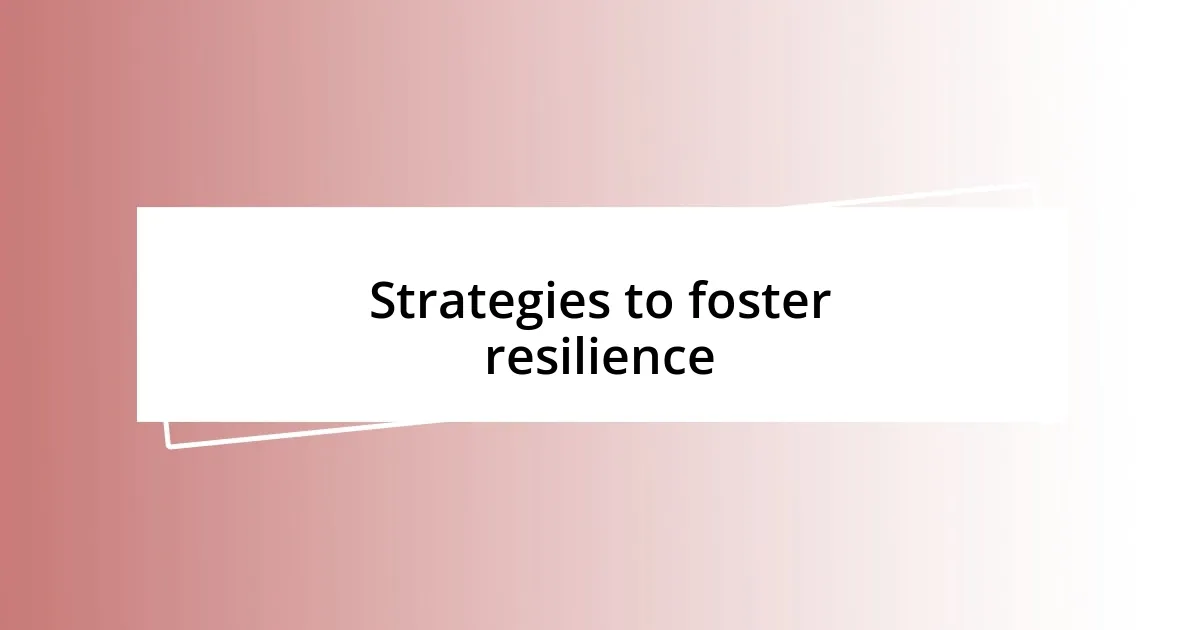
Strategies to foster resilience
Fostering resilience in children requires intentional strategies that empower them to face life’s inevitable challenges. One approach I found particularly effective is encouraging a growth mindset. After my daughter stumbled during a dance recital, instead of focusing on the mistakes, I reminded her of all the hard work she’d put in to get there. That simple shift in focus not only comforted her but also reinforced the idea that effort and perseverance are what truly matter. This mindset allows them to view setbacks as temporary hurdles rather than permanent obstacles.
Another valuable strategy is teaching children self-advocacy. I remember when my son felt overwhelmed with group projects at school. I guided him to express his feelings and ask for help. Watching him articulate his needs not only boosted his confidence but also showed him the power of seeking support when necessary. This experience illustrated how essential it is for children to learn to advocate for themselves in various situations.
Routine also plays a significant role in fostering resilience. Establishing consistent family rituals provides children with a sense of stability. For instance, every Sunday, we sit down for a family meeting where everyone shares their highs and lows from the week. This practice has cultivated an environment where expressing feelings is normalized, helping my kids understand that discussing struggles is part of growth.
| Strategy | Description |
|---|---|
| Growth Mindset | Encouraging kids to view challenges as opportunities for growth rather than failures. |
| Self-Advocacy | Teaching children to express their needs and seek help when they feel overwhelmed. |
| Establishing Routines | Creating consistent family rituals that provide structure and promote open communication about feelings. |

Overcoming challenges together
Facing challenges together as a family can genuinely strengthen our bonds. I remember one Saturday when my daughter and I tackled a tricky puzzle that had us both stumped for hours. Initially, I felt frustrated, but through laughter and teamwork, we not only solved it, but also discovered the joy of perseverance. It made me realize that overcoming obstacles isn’t just about the end result; it’s about sharing the journey, learning to navigate difficulties side by side, and celebrating every tiny victory as a team.
When challenges arise, I’ve found that openly discussing our feelings about those challenges creates a safe space. For instance, after a particularly rough week at school for my son, we sat together on our porch, sipping lemonade while he shared his worries. By listening and validating his emotions, I could see the relief on his face. I think it’s incredible how empowering it can be to simply talk things out! Have you tried doing this with your kids? You might be surprised at the insights and resilience that bubbles to the surface when they feel heard.
Lastly, I believe it’s essential to celebrate resilience as a family. After my son faced a setback in his academics, we decided to have a “bounce-back” night where we each shared a challenge and how we dealt with it. The atmosphere was filled with storytelling and laughter, transforming what could have been a heavy topic into a delightful bonding experience! Reflecting together on our challenges not only brought us closer but also instilled a sense of accomplishment in my kids, reinforcing that together, we can face anything.

Building a support network
Building a support network has been a game changer in my parenting journey. I’ve always believed that surrounding my children with caring adults, like family members and friends, strengthens their resilience. I still remember the first time we invited our neighbors over for a barbecue; it transformed our kids’ views on community. They learned that support comes not just from family but also from friends who can lend an ear or a helping hand.
I also realized how vital it is to connect with other parents. One evening, after a playdate, a fellow mom and I sat together to share our experiences and concerns about raising resilient kids. It felt so refreshing to hear her struggles and to realize that I wasn’t alone; we inspired each other to keep pushing forward. Have you taken the time to build those connections? Sometimes, sharing insights with others can lead to lightbulb moments that significantly impact our approach to parenting.
Don’t underestimate the power of mentors for your children. I encouraged my daughter to join a local art class, where she met a kind teacher who became a great source of encouragement. This teacher helped my daughter embrace her creative side and learn how to overcome challenges in a different context. It sparked a newfound resilience within her. It got me thinking: how can we actively create more opportunities for our kids to connect with supportive figures like this? A solid support network is more than a safety net; it’s a trampoline that can help our children bounce back from life’s challenges with confidence.

Encouraging independence and problem solving
Encouraging independence in children is a journey I’ve truly enjoyed. One day, I decided to let my son bake cookies on his own, guiding him only when necessary. Watching him measure ingredients and navigate the recipe stirred a sense of pride in me. And the sheer joy on his face when he pulled those golden-brown cookies from the oven was a clear reminder: independence fosters confidence, enabling kids to approach difficulties head-on.
Problem-solving is like a muscle that needs regular exercise; the more we work it, the stronger it gets. I’ll never forget the time my daughter faced a challenge assembling a model airplane. Instead of stepping in to assist immediately, I encouraged her to think through the instructions and search for possible solutions. Seeing her furrowed brow transform into a smile when she figured it out was priceless. Have you allowed your kids the space to explore solutions on their own? It’s fascinating how kids can amaze us with their creativity when given the chance.
I’ve learned that allowing children to face small, age-appropriate challenges on their own can lead to significant growth. After a minor disagreement with her friend, my daughter took it upon herself to resolve their misunderstanding. I prompted her with questions like, “What could you say to make things better?” Watching her navigate the conversation and ultimately find common ground filled me with both pride and relief. It made me ponder: how can we create more moments like these where our children can practice these essential life skills? In our experience, these small victories build resilience, ensuring our kids are well-equipped to face the world.
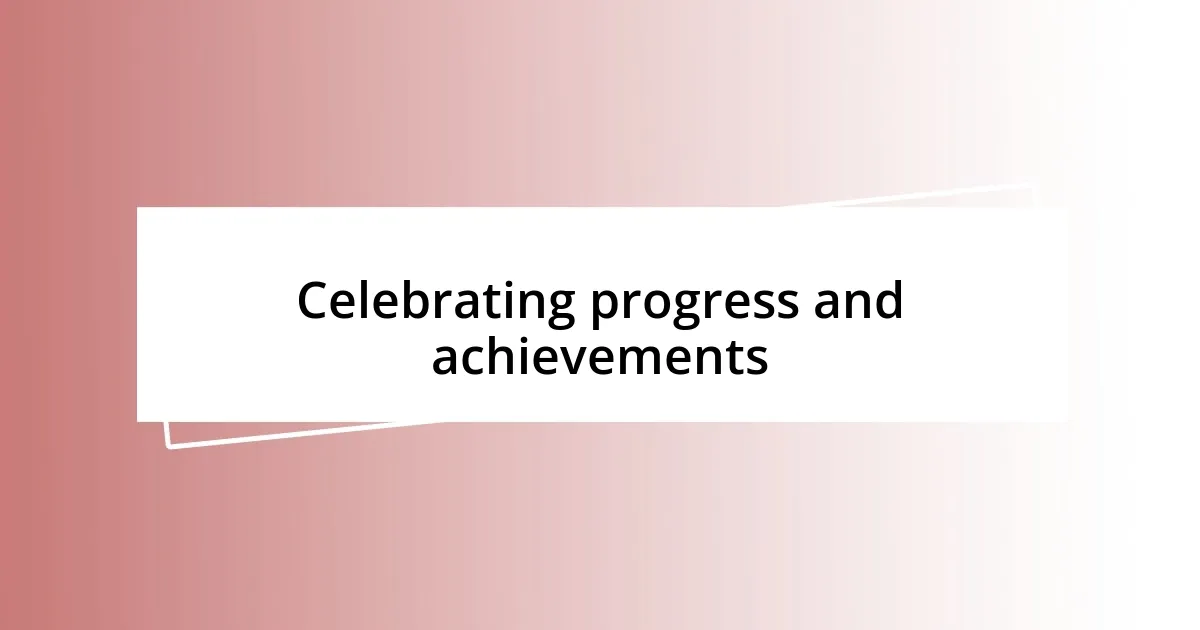
Celebrating progress and achievements
Celebrating my children’s progress has been one of the most fulfilling aspects of parenting. I vividly recall when my youngest learned to ride her bike without training wheels. The look of determination on her face was incredible. When she finally took off, her smile radiated pure joy. It struck me how these small victories lay the foundation for resilience. Have you noticed how celebrating even the simplest achievements can empower kids, making them feel capable of tackling bigger challenges?
Recognition makes a profound difference. I remember creating a “Victory Wall” at home, where we would showcase our children’s achievements. From art projects to milestones like completing a school assignment, this wall became a source of pride. Witnessing their excitement as they added new accomplishments was heartwarming. How do you currently celebrate progress in your home? I’ve found that appreciating their efforts, no matter how minor, can boost their self-esteem and motivation.
Lastly, sharing these moments as a family can enhance the experience. During our weekly family dinners, we each take turns talking about something we accomplished that week. It became a tradition that ignited conversations rich with laughter and encouragement. I recall a touching moment when my son shared how he helped a friend in need. The pride in his eyes and the applause from all of us affirmed the importance of kindness and achievement. It’s these shared experiences that reinforce their resilience and inspire them to keep progressing. Isn’t it amazing how a simple act of celebration can strengthen the bonds that help our children thrive?
